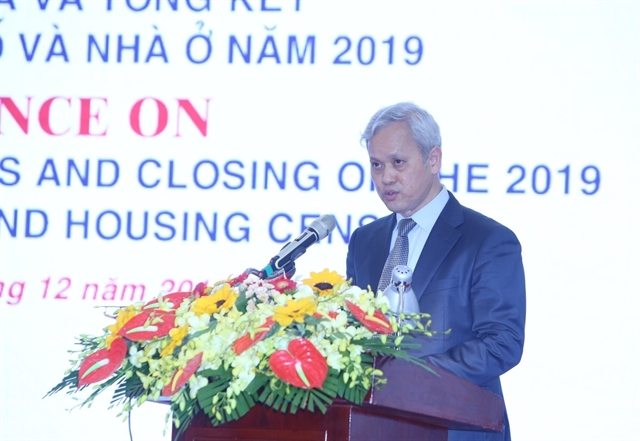 Society
Society


|
| Nguyễn Bích Lâm, director of the General Statistics Office, gives a speech at the conference. — VNA/VNS Photo Danh Lam |
HÀ NỘI — Việt Nam's population has exceeded 96.2 million people, making it the third most populous country in Southeast Asia after Indonesia and the Philippines and the 15th most populous country in the world.
The 2019 National Population and Housing Census, which was announced in a conference held by the General Statistics Office (GSO) and the United Nations Population Fund (UNFPA) on Thursday, revealed the figure. Preliminary results were published in July this year.
The census began on April 1 this year, making it the fifth population and housing census in Việt Nam since the country’s reunification in 1975. The previous census was conducted in 2009.
The census found the population density of Việt Nam was 290 people per square kilometre, up 31 people compared to 10 years before. These results positioned Việt Nam as the third most densely populated country in Southeast Asia, behind the Philippines with 363 people per square kilometre and Singapore with 8,292 people per square kilometre.
The average life expectancy among the Vietnamese population was 73.6 years old, 71 years old for males and 76.3 for females. Life expectancy in the country has increased since 1989, rising from 65.2 in 1989.
More than a third of the population aged 15 years and over graduated from upper secondary school or higher, making up 36.5 per cent, a nearly two-fold increase compared to 2009.
Nearly 88 per cent of the Việt Nam population aged 25-59 participated in the labour force, with the greatest proportion of the labour force aged 25-29.
Household accommodations and living conditions also significantly improved. Nearly 99.4 per cent of households used national grid electricity for lighting and 97.4 per cent of households used hygienic water sources.
Nguyễn Bích Lâm, director of the GSO, said the census would serve the country’s socio-economic development policy making and monitor progress towards the UN's Sustainable Development Goals.
The census applied information technology in all aspects to improve information quality, increase the transparency of statistical analysis, shorten the time for data processing and cut costs, he said.
Naomi Kitahara, UNFPA Representative in Việt Nam, said the census helped the international community understand more broadly Việt Nam’s progress and areas needed for international support.
The success of the census counted on the efforts of the entire political system, including from the Census Steering Committees at all levels, of nearly 147,000 thousands of enumerators, team leaders and supervisors, and most importantly, the participation of the Vietnamese people themselves, she said.
“The success of the census provides a further track record of the Government’s impressive capacity to co-ordinate and conduct the Population and Housing Census and other large-scale population-based surveys,” she said.
Speaking at the conference, Deputy Prime Minister Vương Đình Huệ said Việt Nam was the first country to equip mobile equipment of different kinds for enumerators to collect information and data.
The success was recognised by the international community and several countries came to Việt Nam to learn from this experience, including Sri Lanka and Nepal.
Deputy PM Huệ asked organisations to make reports and analysis based on the census data. The analysis will be the foundation for future socio-economic strategies.
Minister of Planning and Investment Nguyễn Chí Dũng said over the last 10 years, despite a number of difficulties and challenges, Việt Nam had made significant achievements across health care, education, employment and living conditions of the people, through direction from the Party, management from the State and the tireless efforts of the people.
The education level among the population improved and more children are enrolled at school, while the rate of persons with technical qualifications grew whereas population health, especially maternal and child health, advanced, he said.
“The achievements can serve as motivation to realise aspirations for a prosperous and happy country for Việt Nam,” he said. — VNS




